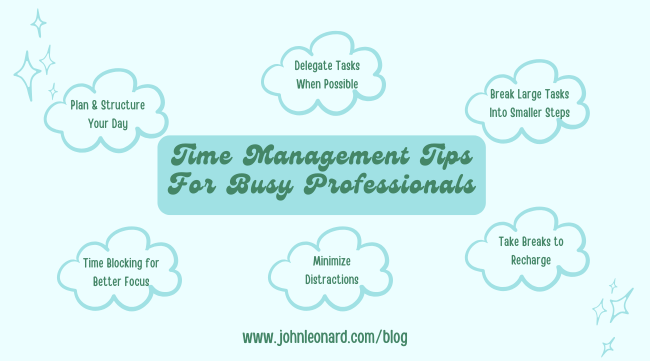
These days, time seems to fly by faster than ever. With constant meetings, tight deadlines, and an endless stream of emails, it’s easy to feel overwhelmed. For busy professionals, managing time effectively is not just about getting things done; it’s essential for reducing stress, increasing productivity, and achieving long-term goals.
Here are several key time management tools to help you take control of your day and maximize your time.
1. Plan and Structure Your Day
One of the best ways to effectively manage time is to create a clear, structured plan for your day. Knowing what you need to accomplish and when helps you stay focused and avoid the chaos of jumping between tasks. This organization also reduces decision fatigue, as your priorities are laid out in advance.
Instead of jumping into the day without a clear direction, take a few minutes in the morning or the night before to outline your key tasks. Having a structured plan acts as a helpful guide, making it easier to stay focused and ensuring that you prioritize what needs the most attention.
2. Time Blocking for Better Focus
Time blocking is a proven strategy that involves allocating specific chunks of time to individual tasks. Rather than multitasking or squeezing tasks into small gaps throughout the day, time blocking allows for focused, uninterrupted work.
By blocking time for specific tasks/projects, meetings, or emails, you ensure each task gets the attention it needs. This also helps set boundaries around your schedule, making it easier to manage responsibilities.
3. Minimize Distractions
Staying focused is often easier said than done, especially in a world full of digital distractions. Whether it’s social media, email alerts, or unexpected interruptions, distractions can quickly drain your productivity.
To stay on track, try turning off non-essential notifications during key work periods. Mute your phone, close extra browser tabs, and set boundaries for when you’re available to chat with colleagues. By limiting interruptions, you can complete tasks more efficiently and stay engaged.
4. Break Large Tasks Into Smaller Steps
Large projects can feel overwhelming, often leading to procrastination. Breaking them down into smaller, manageable steps makes the workload feel more achievable and helps you make steady progress.
Instead of focusing on the entire project, identify a few actionable steps and start with those. Completing each small milestone builds momentum and makes the overall task less intimidating.
5. Delegate Tasks When Possible
No one can do everything alone. If you’re overloaded, look for opportunities to delegate tasks that don’t require your specific expertise. Delegation not only frees up your time but also empowers your team and allows others to contribute their skills.
In a collaborative environment, sharing the workload leads to better results and allows everyone to focus on what they do best.
6. Take Breaks to Recharge
It might seem counterintuitive, but taking regular breaks can improve your time management. Working nonstop often leads to burnout and a loss of focus. Taking short breaks throughout the day helps you reset and return to your tasks with renewed energy.
Even stepping away for a few minutes to go for a walk or grab a coffee can make a noticeable difference in your concentration and mood.
Conclusion
Time management is a vital skill for busy professionals. Whether you’re planning your day, blocking out time for focus, minimizing distractions, or learning to delegate, the goal is to use your time intentionally. With consistent effort, you’ll find that managing your time becomes less about racing the clock and more about working smarter and living better.
Looking for more lifestyle tips? Subscribe to The JOHNLEONARD Blog below!

